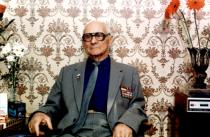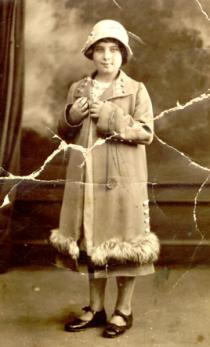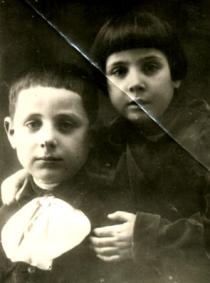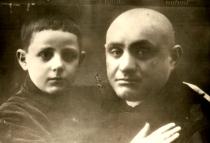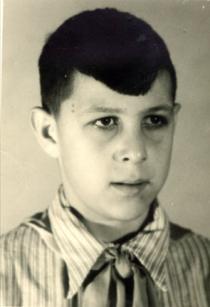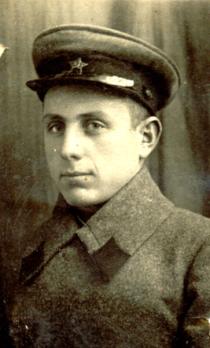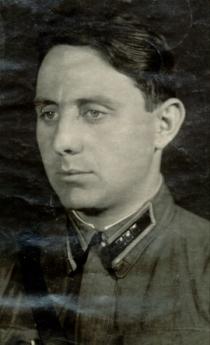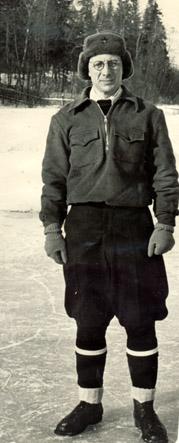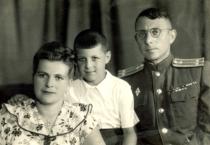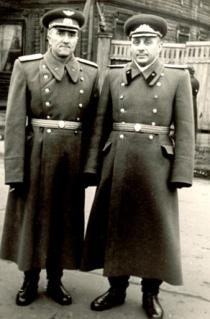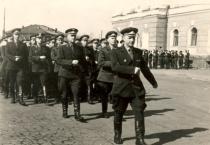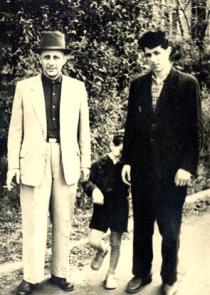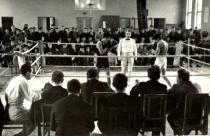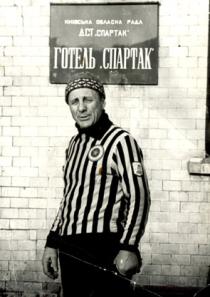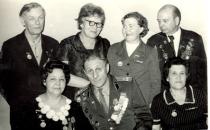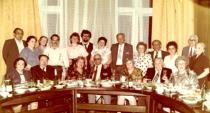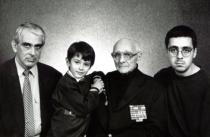This is our family photograph. From left to right: my wife Maria Akimova, my older son Oleg and I, lieutenant colonel Grigoriy Kagan, senior lecturer of the 3rd AACD anti-aircraft artillery school. This photo was taken in Aluksne town Latvian SSR in 1954.
In 1940 I entered the Military Electrotechnical Academy of Communication in Leningrad. In September 1940 I started my studies in the Academy. We lived in barracks. One day I met Masha, Maria Akimova on a tram stop. I corresponded with Maria Akimova all years of war. Maria came from a small village near Smolensk, I don't remember its name. Her parents Pyotr Akimov and Aksinia gave birth to four children. Aria had to take care of her younger sisters and brother, being the oldest in the family. They perished during the Great Patriotic War. After finishing secondary school Maria went to her aunt in Leningrad. Maria was a siege survivor. We decided to get married after the war. I went to see her in 1946 and we registered our marriage in a registry office. Of course, we had no wedding party considering the circumstances. I was allowed a few days' leave to spend with my wife and then I returned to my division. My parents had nothing against my marriage with a non-Jewish woman. They thought that our love was what mattered. On 11th November 1946 our first son Oleg was born.
There was already strong anti-Semitism in the society. It grew stronger since 1948, the period of struggle against cosmopolitism. I was appointed deputy chief of communication forces of the 25th Air Force army deployed in Leningrad. I went to the human resource department of the 25th army. Their HR manager was happy to see me and said I was expected. However, when he read my surname in my diploma, his expression changed and he said that regretfully he had forgotten that this position had already been assigned to someone else. After graduating the Academy with honors and having a job assignment I had no job while I had to provide for my wife and my 4-year old son. I could not find a job. The three of us had to live on 90 rubles per month. I received this allowance for my rank and this was the only income our family had. Of course, I understood this had to do with my Jewish identity: the other graduates of the Academy, who had worse marks than I, were appointed to higher positions and were duly promoted. The military career was closed for me. Some time later I was invited to Moscow where I got an offer to fill the position of a lecturer at a military school. I had a choice to teach electric engineering in Zhytomyr, and this position corresponded to my rank of major, or physical basics of radio equipment and location in anti-aircraft artillery school #3 in Aluksne town in Latvia, and this position corresponded to the rank of lieutenant colonel. I decided for Aluksne, thought Zhytomyr was near Kiev and I could visit my parents if I had decided to go there.
My wife, my son and I moved to Aluksne. The Baltic Republics were annexed to the USSR in 1940. The Latvians considered it to be occupation of their country. They treated us as if we were occupants and they were right since we behaved like occupants. When I arrived I was offered to choose some accommodation. I looked around and decided for a small cozy cottage in the center of the town. The owner of the house was ordered to vacate one room for me and he did it obediently. He did not have the right to argue since he might have been arrested for disobedience otherwise. Such requirements were explained as needed by the state. I spoke fluent Latvian within half a year and spoke it without an accent, though I did not know the grammar.
This period was very pleasant for me. I was also involved in the sports activities at my school. I was a football trainer and played hockey for my school. Both students and lecturers had a warm attitude toward me. I liked and enjoyed my job. However, I had to think about my career.

